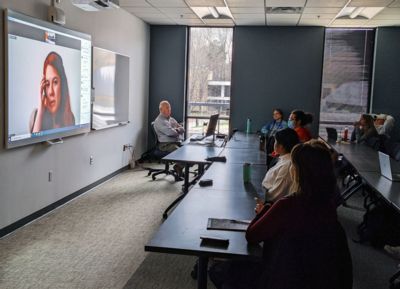
Mykolas Romeris University (MRU) student Karina Bodnar, from Ukraine, recently participated in an online discussion with students from Georgia-based Dalton State College about the personal and economic circumstances Ukrainian citizens are facing due to Russia's invasion of Ukraine.
Dalton State College International Business students were given the opportunity to ask Ms. Bodnar questions in an awareness building exercise about how to help and "What can we do?” in a course taught by Dr. Ray Smith.
Students in Dr. Ray Smith’s International Business course and Bodnar, a former student of Dr. Smith, participated in the exercise earlier this month. Bodnar, currently living and studying in Lithuania at Mykolas Romeris University, shared a first-hand account of the circumstances Ukrainian citizens are currently facing due to Russia's invasion of Ukraine. Smith is an affiliated Associate Professor at MRU.
Bodnar shared a history of the conflict between Ukraine and Russia, noting it stemmed from tensions of economic forces. According to Bodnar, Russia invaded the Donbas region of Ukraine, which brings the most money to Ukraine, approximately seven-to-eight years ago.
"Russia does not have access to warm waters for business commerce,” said Bodnar. "Invading Ukraine was a way for Russia to access warm waters in the Donbas region of Ukraine, which is connected to the Mediterranean Sea.”
Additionally, this area is where Ukraine had much coal production. “Long story short, we do not have any coal anymore, because when they were invading, they just took all of it out. So, no coal,” said Bodnar.
"For about eight years there was conflict in this territory, but it was kind of calm. People still worked there, but other areas of Ukraine were untouched, so most of the people forgot it was happening," she said.
The calmness gave way to war on February 24, 2022, when Russia bombed the Ukrainian capital city, of Kyiv.
“I was sleeping here in my bed in Vilnius, where I study. I woke up at five in the morning from texts from my friends and calls from my mom that Kyiv was being bombed,” said Bodnar. “To describe how I felt, I think empty is the best way to describe it, because when you see the pictures of the places you’ve been to, places you’ve grown up, being destroyed by rockets, it kinda makes you, I wouldn’t say feel emotional, but, really, it makes you feel emotionless, because you feel like it’s not a reality.”
Alarms meant to warn Ukrainian Citizens of active bombings were not working the first few days. Bodnar said she would check news posts on her phone for reports of bombings.
“What I would do the first three, four days until they started working, I would always have my phone constantly updating and calling my mom every time she had to go into a bomb shelter. I know most of you probably will not understand but telling your parents and your friends to please go into a bomb shelter because bombs could land, it kind of crushes you,” said Bodnar.
"We want to enhance students’ international awareness by bringing others throughout the world into the classroom," said Dr. Marilyn Helms, Dean of the C. Lamar and Ann Wright School of Business. "Business situations and external environments often change daily, so it is important to be as relevant and current as possible with our classroom discussions. Dr. Smith used his international Fulbright and teaching connections to make this happen, and he did it seamlessly. This shows how connected and global our faculty are."
“This opportunity gave students a personal perspective on the situation in Russia and Ukraine," said Helms. "It sparked an awareness in students to follow this situation even more closely in the news, because they can relate it to Karina’s story. It prompts them to question 'What does it mean when Apple or McDonald's pulls out of Russia or what does this mean for oil prices in Dalton, Georgia?'"
In preparation for the exercise, Dr. Smith’s students studied the CIA's World Fact Book about Ukraine, the Human Development Index and "a variety of business websites more familiar with Russia and Eastern Europe," said Dr. Smith.
Bodnar shared three primary ways people can help: raising awareness online, economic support for Ukrainian citizens and economic support for the Ukrainian Government.
"Ukrainian people do not have any products. They do not have any food or money, because they are out of work," said Bodnar. "A lot of people have actually been booking Airbnb's in Ukraine, and the money will go directly to the owner. I do not recommend going there in any way. It is just a way to donate and help the people of Ukraine.”
There is a bank account open for donations to the Ukrainian Government, "which supplies the army, all of the people, all of the volunteers," said Bodnar. “Ukraine was not ready, so some of the army divisions do not even have protective vests. They are just there, fighting in their regular jackets.”
The Wright School of Business International Business course provides a broad overview of international business and trade, and the impact of the international business environment on management decisions. Topics of the course include trade, barriers to trade, and the relationship between international business and international relations; effects of international business decisions of culture, political, legal, and economic forces; effects of government intervention and the role of social and economic aid organizations.
The international business curriculum is dynamic and we are fortunate Dr. Ray Smith, an affiliated Associate Professor at MRU, has the global contacts to make these global headlines more real to our business students, noted Dr. Helms.